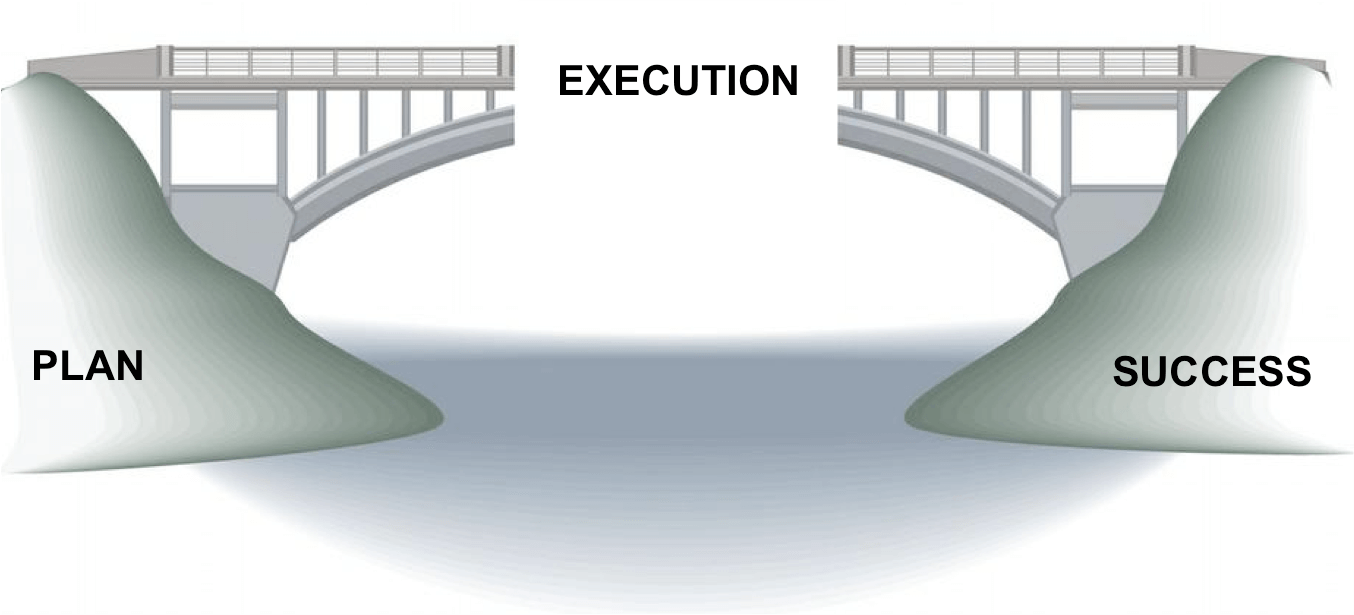This website uses cookies. By continuing to browse the site, you are agreeing to our use of cookies
Bridging the Gap between Planning and Execution
Business Process Services
August 20, 2020
Bridging the gap between planning and execution is an age-old challenge in any project. Planning is never linear, there are a large number of variables and uncertainties involved in it that make execution even more difficult. There’s an old saying, “It’s easier said than done”. While making a project plan, a Transition Manager takes into consideration realistic estimates for duration, resource requirement and costs of each of the activities keeping in mind the end goals of the project. In spite of meticulous and rigorous planning, there is a huge difference between making a project plan and delivering the project as per the agreed plan.
A project plan gets life when execution of the project starts. This is the phase where the science of project management is transformed into art.
A project goes through multiple phases to be successfully executed. Proactively identifying project risks, working with multiple stakeholders to put mitigations into place and resolving the challenges observed during execution phase leads to project success.
The Transition Manager should foresee the potential roadblocks that will impact the timeline, cost and quality of project execution and resolve the same to ensure project success. The key is to understand how these gaps affect a project lifecycle and prepare the strategy accordingly.

Listed below are some strategies that can help bridge the gap between Planning and Execution phases of any project:
Begin with the end in mind:
Start with a clear understanding of the goal. What is the end objective of any project? Successful go live with minimal disruption
At Hexaware, Transition framework enables the Transition Manager to understand client expectations at the onset and plan keeping in mind the end outcome. The Transition Manager should always focus time and energy on things that can be controlled. This strategy allows clarity on defined goals and objectives and helps monitor critical activities.
Engagement and accountability:
Before planning can even begin, it is vital to engage the key stakeholders and the core project team for end-to-end project planning and execution. Communication plays a significant role in ensuring all the key members are clear on their roles and responsibilities for the project along with the timelines and deliverables expected of them. This ensures that the project team is aware of the overall project deliverables and their role in the project. This also ensures that the project team members are in control of the tasks to be executed.
At Hexaware, project team is engaged and committed to deliver required outcomes. Robust RACI mechanism is followed to ensure 100% contribution by each member basis their domain and functional expertise. Regular and robust review mechanism enables timely completion of the tasks assigned to relevant stakeholders ensuring there are no slippages in the project. The RACI matrix develops awareness amongst the project team members and regular reviews encourage effective participation and collaboration.
Transparency and communication are cornerstones in plan execution. If everyone can see their piece of contribution and how it fits into the larger project deliverable, they will be more likely to complete the actions they’ve been assigned in a timely manner and as per the required quality standards.
Effective Business Change Request Management
Change Management is the method by which any changes to the project (e.g. scope, deliverables, team structure, SLAs/KPIs, timescales and costs) are formally defined, evaluated and approved prior to implementation. The process entails completing a variety of control procedures to ensure that, if implemented, the change will cause minimal impact to the objectives of the project.
Effective Change Management ensures that all change activities are well planned and measured such that the project team is provided with the right amount of leadership, guidance, tools and ownership at the right time. The success of any project relies on people and their acceptance to change.
Robust Governance model
A robust governance approach followed during the transition through a synchronized rhythm of meetings and reporting, helps maintain complete transparency and ensures that all the key stakeholders are kept informed of project progress and any risks/ issues in the project. Regular multi-layered governance meetings ensure that decisions are taken swiftly in the right forum to support any risk mitigation.
Transition Manager should outline key activities to be covered during governance meetings basis the project’s scope, timeline, complexity, risk, stakeholders and importance.
Activities include, weekly internal and external governance calls, steering committee meetings, open forums to raise issues, find resolution, detailed communication and escalation matrix.
Be Open and Flexible:
Change is inevitable, but still, acceptance is difficult.
Taking cognizance of the recent events and the need to adjust to the new normal, Hexaware has already adopted a Touchless transition approach and a Work from Home setup.
A Transition Manager will face different types of projects, thus the Transition Manager should be open to changes in business environment impacting the plan and should be able to blend in every project. Being adaptive and able to course correct their projects are some of the qualities that a Transition Manager must have.
Conclusion:
A famous Project Auditor, Joy Gumz has stated, “Operations keeps the lights on, strategy provides a light at the end of the tunnel, but project management is the train-engine that moves the organization forward.
About the Author

Yusuf Mistry
Read more
Related Blogs

From Manual to Machine: Maximizing Cost Savings with Intelligent Process Automation
- Business Process Services

Achieving Cost Efficiency Through Global Business Services Strategy
- Business Process Services

Generative AI for Marketing: The Future of Cost-effective Engagement
- Generative AI
- Business Process Services

Unlocking Generative AI for Hyper-personalized Customer Experiences
- Generative AI
- Business Process Services

Executive Administration Services: BFSI’s Right-hand Partner
- Generative AI
- Business Process Services

Generative AI in Customer Service: Going Beyond Traditional Chatbots
- Generative AI
- Business Process Services

Generative AI for Content Creation: The Future of Content Ops
- Business Process Services
- Generative AI
Fund Services Back Office Digitalization: A Transformation Long Overdue?
- Business Process Services

Mastering Customer Service Experience: Strategies for Success
- Business Process Services

The Rise of Omnichannel Customer Service: Unlocking Excellence in Customer Care
- Business Process Services

Ready to Pursue Opportunity?
Every outcome starts with a conversation







